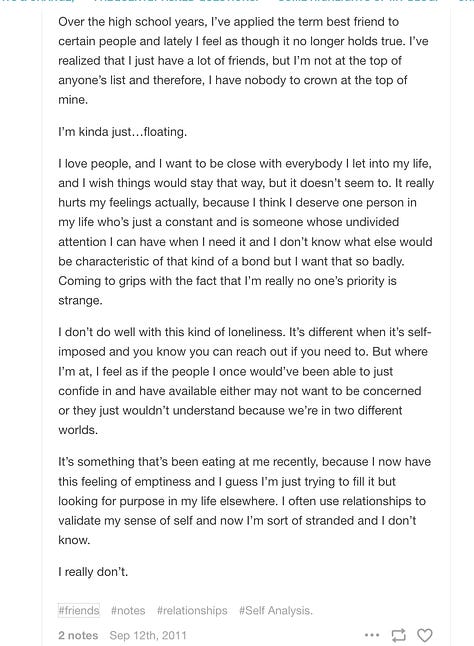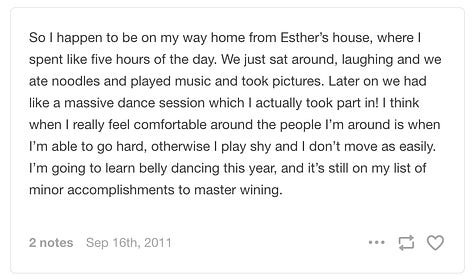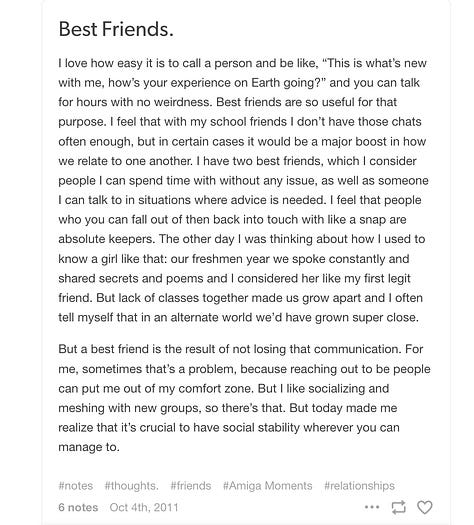behind the times
after memory loss from years of trauma, diaries reassure me that i used to exist
Dearest Diary,
Land. Jewels. Art. Wine. Memory. Here we have an unranked list of things that appreciate in value over time. The appraisal of a memory is a tricky calculation. All memory is not equal; some are deemed worthier of preservation than others or concurred to be little else but waste to all aside from the sparse few who prize them. What would you sacrifice for the nonce privilege of instant access to the diary of a grandchild three greats away?
Time loops through a closed circuit of continuously overwritten tape, cannibalizing and regurgitating itself until the sun falls out of the sky. What should we release to make room—there’s too much to remember, don’t you agree?
Every day someone fades into obscurity as their name is uttered for the last time, dissipating into the darkness that will wash them clean of history before re-release into the shuffle. When the day comes to forget, we’d hate for it to be you.
cinncerely,
The Hauntlings of the Void
“When did we become best friends?”
I imagine my eyes were darting back and forth as if I were actually scanning the physical inventory of my memory, trying to find a record, pull out a date. My mental search returned no results. “I’m not sure,” I texted back. “But I could probably find out if I check my Tumblr.” My best friend and I had met in Junior year of high school, we knew that much, and we had become closer as Seniors, which put the answer somewhere in the ballpark of 2012, the year we graduated. She laughed it off, saying I didn’t need to go through all the hassle, that she only thought it might be nice to have an official “Friendiversary” date. Adorable, right? I still promised to look into it, assuring her it was hardly any trouble. “It’ll be fun for me,” I said.
A week or so later, I logged into my old account. I am so relieved that Tumblr is still standing. My account has taken up digital real estate for the last fifteen years, which feels miraculous considering apps and websites go sinking all the time, and with them all associated user-generated content is wiped off the face of the internet. It’s a shame. Every time I think about this, I tell myself I need to download my full archive from Tumblr. I don’t know how to go about it but I need to figure it out. My Facebook got hacked in 2020 and my original Instagram got deactivated alongside it, so Tumblr is my longest standing digital record: if I lose it, I lose everything.
I began posting to the site in the summer of 2009, right before I was due to begin my freshman year of high school. As a fourteen year old girl, I used Tumblr as an online diary, and spoke openly about my laments and my frustrations and my budding friendships and my crushes, and I posted pictures of myself and my outfits. I updated it every day and used the tagging system diligently. For tracking the origins of my teenage friendship, there could be no better resource than this.
I perused my archives and skimmed any posts including the word “friend.” It wasn’t long before I noticed a post dated early September 2011 where I complained about feeling lonely. Two weeks after that, I’d shared an update about having a dance party at a friend’s house and how it had been so much fun and how overcome with gratitude I was to be connecting to others in the world. Finally, in early October 2011, on the day of my best friend’s birthday no less, I posted about how Best Friends are so important in life—that was the clincher. The timeline made sense. I screenshot everything and texted my bestie excitedly: “According to my blog, we probably became friends around September 16, 2011!”



I couldn’t help but feel proud of myself as a diary-keeper. Neither of us had expected me to actually find a real date. But we agreed the evidence seemed solid, so we’d celebrate September 16th moving forward—our official designated Friendiversary. 🥹 How precious, I thought. And without my diary, this realization wouldn’t have been possible—seriously, how else would I have ever figured that out?
Are diaries a girl thing?
Historically, no. (Consider that the colonizers famously kept records of their evils, for example.) Men document their experiences too, both then and now, though they probably call it “journaling.” It’s hard to say when this shifted into a gendered activity in Western society, but it could be that over time the practice grew commonplace among bored housewives to the point that they became the face of it. There’s something dismissable about a woman dedicating (i.e., wasting) time to creating a firsthand account of her livelihood and experiences. The marketing tactics of stationery companies do little to beat the allegations that memory keeping is a woman’s pastime, advertising the perfect gel pen, the prettiest paper, the cutest highlighters and stickers, the shiniest heart shaped lockets. From young, girls are encouraged to keep secrets and lock the most vulnerable and private parts of themselves away, later growing into women prone to rumination and anxiety, who can’t help but write everything down to keep their feelings from spilling out and unraveling them completely.
Everyone talks these days about “romanticizing your life.” It’s great advice. I like to mythicize mine. When I talk about my life, I can sense myself seeking some sort of connective tissue, a narrative thread that puts all the mess into perspective and recognizes the motifs hidden in plain sight. I write about my experiences as if I were giving the rundown on the latest episode of a spicy drama. Of course, it mostly isn’t, my life, full of drama; there are countless days when my story is very slice of life, very quiet and ponderous.
I’m so used to ruminating in front of a live studio audience—the internet, I mean. When I was in middle school, my mother reached under the mattress of my bed while I was away, used the spare key for my locked diary, read the contents and called me a whore in the evening when I came home, a whore for crushing on boys instead of doing my schoolwork, like they were mutually exclusive. How humiliating, in a moment like that, after you’ve been hit and screamed at and have cried so hard your nose feels raw from all the rubbing and your face is taut from the dried salt of your tears, to read back the words of your infatuation to a boy who doesn’t even like you back. How pathetic. So that was the trauma that led me to telling my life story online, where it was safest from my mother’s eyes, because my mother was a working immigrant lady with five other kids, who didn’t use computers recreationally and therefore wasn’t savvy enough to track my usage of it. My father could’ve gatekept social media from me and my siblings if he tried, but where he possessed tech-savviness, he lacked interest in the emotional interiority of his daughters. Phew.
So, yeah, as I stumbled into sentience and coherent identity, I documented it live online, and thankfully I made it entertaining or mopey enough that some of the strangers peering into me stuck around. They even chimed in. There was something thrilling about saying, “This is what happened today!” and having a real person relate or offer advice. My diary-keeping shifted from the traditionalist practice of secrecy and second self into something more communal, a dialogue between me and the panel of benevolent judges privy to the messiness of my work-in-progress personhood. I was lucky to have these spaces to exist safely. I learned so much about myself through writing it all down. For example, I could recognize when I was repeating myself, circulating too often back to a feeling or an idea, which sometimes prompted me to speak up or muster the courage to act. Or I could track the timeline of a relationship, pinpoint the moment where I caught the ick or fell in love, and laugh at how the present measured up to those clumsy first impressions. I was able to spot patterns years and years apart—“I seem to always get so sad in April, what’s that about?”—and lay out the months like a deck of cards as I inspected all my entries from a given season. Time started to feel cyclical the closer I looked. Old things kept happening in new ways. New things would feel familiar. My life felt neat and clearer and most days still meaningless but also profoundly rich with lore. My diary became a database of the Shared Experience that was me.
Despite their reputation as relics of the past, diaries in their formation are always earnestly grasping at the future. The events they discuss are not part of the past yet, after all—the happenings are ongoing, still developing, and each day raises a new question that the next one tries to answer. If I write about a new love interest, beneath the details is the question, “How will this end?” In fact, it’s the question under everything else I write about, too: What happens next? How will this end? There is always hope wrapped into it, which is a euphemistic way to say there’s always a latent fear. Looking through my diaries, I can understand exactly what I was wishing for at any moment on any given day, and measure how far I’ve strayed from that imagined future, counting up the alternative lives I would had to have lived between the past and now to get there. I tried (and still try) my best to dream up soft futures for myself, and to grasp for them with outstretched arms and widened eyes, while laying out a soft landing. Dreaming and reaching makes it hard to live in the present, but it’s always felt more productive than living in the past.
I grew up with a mother who lives in the past. The past is spilling out of every corner and surface of our home. I know what it looks like when the past starts to rot. When it gets stagnant and festers. When it takes up so much space that we have to ration the future between siblings. I watch my mother get so bored with her own archive that she brings home the pasts of other people—a lucky find from the sidewalk or an estate sale or an antique shop—as our home grows slowly further frozen in time. I watch her justify keeping everything and learn that any item, no matter how small or innocuous, can be a bridge my mother refuses to cross yet simultaneously can’t bear to burn. For her, what lies on the other side of it is not the prize. It is the bridge itself. She sets up camp in the center of it; now we can’t cross either.
I don’t live in the past. Yes, I keep a record of everything that happens to me but I don’t live in the past. I reject the narrative that moving forward necessitates leaving myself behind, that one must part with their history to be free of or surpass it. We talk about baggage and clutter, we talk about how people are “clinging” to memories, insinuating that you must rid yourselves of the old you in order to make room for the new. My memories—the very layers of me—are not anchors. I carry them with me because that’s what diaries are for: to store the parts of the past that resonated with me, that changed me the most, that kept me up at night. The version I keep is the version I lived, and when I look at it I can remember that I lived, which is easy to forget when you’re in the future, where I often reside. In the future, my living present is already outdated. My days wilt into wasted potential halfway through or sometimes sooner, seemingly doomed to forever lag ten steps behind. But my diary proves that that isn’t true, countering false memory and temporal impatience with its lasting reminders that the present happened with perfect timing. It holds the proof that I happened, that I was here, that the days didn’t just slur into a singular amorphous gray and fogging memory and slip through me like oil, but that they had color and character and plot and suspense, and they were well lived-in, gently tearing at the seams and worn to the point of fraying, but never impossible to thread back together again and—if but for a brief moment—relive.
as a parting gift, you may enjoy: Dès Vu: The Awareness That This Will Become A Memory






